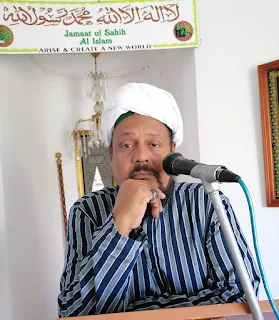 In his Friday Sermon of 12
April 2024~ 02 Shawwal 1445 AH, Imam- Jamaat Ul Sahih Al Islam International, Hazrat
Muhyiuddin Al Khalifatullah Al Mahdi Munir Ahmad Azim (aba) of Mauritius, spoke movingly about the plight of several Muslim communities
around the world. In China, the communist regime is applying repressive methods
to eradicate the cultural memory, social practices, and religious consciousness
of the Uighur Muslims of Xinjiang. Likewise, in Myanmar, the Rohingya Muslims
are facing worst forms of violence and ethnic-cleansing at the hands of the
Buddhist extremists and the military junta. Elsewhere, several Muslim minority
communities are facing the onslaughts of anti-Islam forces. Majoritarian,
ethnic-nationalist parties in some countries, as well as the secular fascists
in other lands, are equally united in their hatred of Islam, and they scheme to
restrict the basic human rights and cultural identity of the Muslims in their midst.
It seems as though other religious groups, dominant as they are today in their
lands, are mortally afraid of what the future holds for them as Islam
gradually spreads in these lands incrementally. On the other hand, in Muslim
nations such as Yemen, Syria and the Sudan, civic conflicts and internecine
warfare have taken a toll on entire Muslim communities, with unending violence
devastating every day life in these societies for years altogether, leading to
large scale forced displacement and migration.
In his Friday Sermon of 12
April 2024~ 02 Shawwal 1445 AH, Imam- Jamaat Ul Sahih Al Islam International, Hazrat
Muhyiuddin Al Khalifatullah Al Mahdi Munir Ahmad Azim (aba) of Mauritius, spoke movingly about the plight of several Muslim communities
around the world. In China, the communist regime is applying repressive methods
to eradicate the cultural memory, social practices, and religious consciousness
of the Uighur Muslims of Xinjiang. Likewise, in Myanmar, the Rohingya Muslims
are facing worst forms of violence and ethnic-cleansing at the hands of the
Buddhist extremists and the military junta. Elsewhere, several Muslim minority
communities are facing the onslaughts of anti-Islam forces. Majoritarian,
ethnic-nationalist parties in some countries, as well as the secular fascists
in other lands, are equally united in their hatred of Islam, and they scheme to
restrict the basic human rights and cultural identity of the Muslims in their midst.
It seems as though other religious groups, dominant as they are today in their
lands, are mortally afraid of what the future holds for them as Islam
gradually spreads in these lands incrementally. On the other hand, in Muslim
nations such as Yemen, Syria and the Sudan, civic conflicts and internecine
warfare have taken a toll on entire Muslim communities, with unending violence
devastating every day life in these societies for years altogether, leading to
large scale forced displacement and migration.
In the killing fields of Gaza and elsewhere in the
occupied territories of the Palestinian people, Israel's relentless bombing campaigns over the last
six-months have murdered more than thirty five thousand persons- a large majority of them children and women; hundreds of thousands more became displaced in the land,
with thousands critically injured while entire hospitals and housing buildings
stand destroyed, making human life virtually intolerable in the land. And yet, the people
of Palestine patiently awaits the dawn of their liberation from the clutches of
their racist oppressors. Hazrat Khalifatullah's speech concludes with a long,
heart-felt prayer to the Almighty God for the destruction of the forces of
evil, and for the alleviation and edification of the suffering Muslims of the
world, Insha Allah, Aameen.
Read the Friday Sermon Below:







